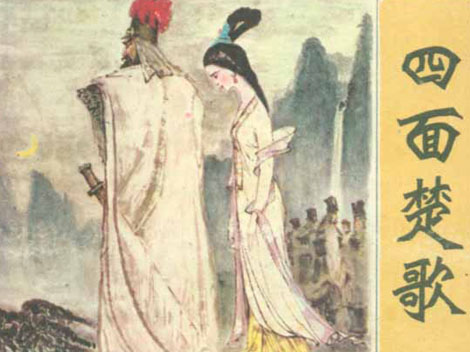ERFGENAMEN van de DRAAK
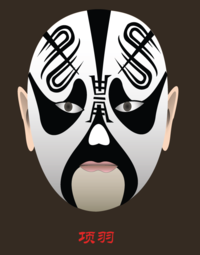
Twee voorstellingen vanuit de gedachte dat de wereld één dorp, één gemeenschap is. Niet vanuit een scheiding in Chinees of Nederlands, maar vanuit een persoon hier en nu in discussie met beide. De schrijver/regisseur wil uitdrukking geven aan het veranderingsproces die hij nu ondergaat na drie jaar in Nederland. de nieuwe westerse inzichten en theateropvattingen verrijken niet alleen, maar houden hem ook een spiegel voor om te kijken naar eigen cultuurgoed en theatertradities, waarvoor hij in eigen land minder of anders oog had. Een confrontatie tussen traditionele chinese opera en westerse speelstijlen. Met als specifiek thema dualiteit: Er is geen enkelvoudige uitleg. Iets is tegelijkertijd niets. Tegenover het denken van goed of slecht, bestaat ook het idee van goed en goed.
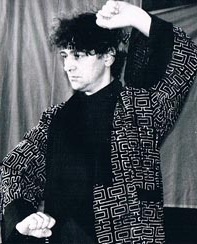 OP HET EERSTE GEZICHT
OP HET EERSTE GEZICHT
Een oude tempel, historische plaats van handeling uit de opera "Afscheid van de onoverwinnelijke koning van zijn concubine".vormt de ontmoetingsplek van een medische student, een oudere westerse theatermaler en een jonge Chinese vrouw. Zij is levensmoe. Tussen deze laatste tee klikt het op het eerste gezicht. Zij treffen elkaar in de oude scene van Ba Wang en zijn concubine Yu Ji. Als het meisje aan het eind van hun dans haar fatale daad verricht, blijkt de plaats omsingeld door politie. Een ontmoeting tussen het westers theater en de Chinese opera.
Spelers: Wang Lei, Rob Duyker, Charley Barnaart, Regie: Zhu Jun
Farewell My Concubine is a Chinese Peking Opera. |
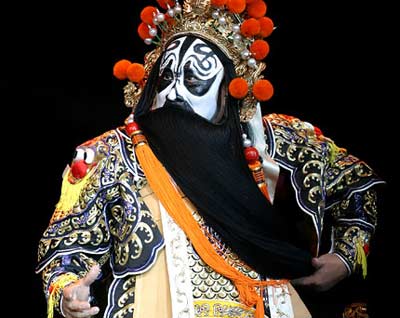 |
|
“Having Courage but No Strategies” - “Yǒu Yǒng Wú Móu” (有勇無謀) - Xiang Yu - Chinese aristocratic general and cultural hero.(Chinees: 西楚霸王; pinyin: Xīchǔ Bàwáng) Rebellion against the Qin Dynasty In 209 BC, during the reign of Qin Er Shi (successor of Qin Shi Huang), peasant rebellions erupted throughout China to overthrow the Qin Dynasty, plunging China into a state of anarchy. Yin Tong, Grand Administrator of Kuaiji, wanted to start a rebellion as well, so he invited Xiang Liang to meet him and discuss their plans. However, the Xiangs lured Yin into a trap and killed him instead, with Xiang Yu personally striking down dozens of Yin's men. Xiang Liang initiated the rebellion himself and rallied about 8,000 men to support him. Xiang Liang proclaimed himself Grand Administrator of Kuaiji while appointing Xiang Yu as General. Xiang Liang's rebel force grew in size until it was between 60,000 to 70,000. Later that year, Xiang Liang was killed in the Battle of Dingtao against the Qin army led by Zhang Han and King Huai II granted Xiang Yu the title of "Marquis of Lu" (魯公), and placed him second-in-command to lead an army to reinforce Zhao Xie. At the same time, the king placed Liu Bang in command of another army to attack Guanzhong, the heartland of Qin. The king promised that whoever managed to enter Guanzhong first will be conferred the title of "King of Guanzhong". Feast at Hong GateAfter his victory in the Battle of Julu, Xiang prepared for an invasion on Guanzhong, the heartland of the Qin Dynasty. In the winter of 207 BC, the last Qin ruler Ziying surrendered to Liu Bang's army in Xianyang (capital city of Qin), bringing an end to the Qin Dynasty. When Xiang arrived at Hangu Pass, the eastern gateway to Guanzhong, he saw that the pass was occupied by Liu's troops, a sign that Guanzhong was already under Liu's control. Liu's general Cao Wushang sent a messenger to see Xiang, saying that Liu would become King of Guanzhong in accordance with King Huai II's earlier promise, while Ziying would be appointed as Liu's Chancellor. Xiang was furious after hearing that. At that time, he had about 400,000 troops under his command while Liu only had a quarter of that number. As strongly encouraged by his advisor Fan Zeng, Xiang invited Liu to attend a banquet at Hong Gate and intended to kill Liu during the feast. However, Xiang listened to his uncle Xiang Bo (a friend of Liu's strategist Zhang Liang) instead and spared Liu's life. Liu escaped later under the pretext of going to the latrine. Xiang paid no attention to Liu's presumptive title and led his troops into Xianyang in 206 BC. Xiang ordered the execution of Ziying and his family, as well as the destruction of the Epang Palace by fire. It was said that Xiang would leave behind a trail of destruction in the places he passed by, and the people of Guanzhong were greatly disappointed with him.[4] Division of the empire
After the downfall of the Qin Dynasty, Xiang offered King Huai II the more honourable title of "Emperor Yi of Chu" and announced his decision to divide the former Qin empire. Xiang declared himself "Hegemon-King of Western Chu" (西楚霸王) and ruled nine commanderies in the former Liang and Chu territories, with his capital city at Pengcheng (present-day Xuzhou). In the spring of 206 BC, Xiang divided the empire into eighteen kingdoms, to be granted to his subordinates and some leaders of the former anti-Qin forces. He moved some of the rulers of other states to more remote areas and granted the land of Guanzhong to the three surrendered Qin generals, ignoring Emperor Yi's earlier promise to appoint Liu Bang as king of that region. Liu was moved to the remote Hanzhong area instead and given the title of "King of Han" (漢王). Defeat and downfall In 202 BC, Han armies led by Liu Bang, Han Xin and Peng Yue attacked Western Chu from three sides and trapped Xiang's army, which was low on supplies, in the Battle of Gaixia. Liu ordered his troops to sing folk songs from the Chu region, to create a false impression that Xiang's native land of Chu had been conquered by the Han forces. The morale of the Chu army plummeted and many of Xiang's troops deserted in despair. Xiang sank into a state of depression and he sang the famous Song of Gaixia. His concubine Consort Yu committed suicide. The next morning, Xiang led about 800 of his remaining elite cavalry on a desperate attempt to break out of the encirclement, with 5000 enemy troops hot on pursuit.
Consort Yu(died 202 BC), Yu Miaoyi, popularly known as "Yu the Beautiful" (虞美人), was a concubine of Xiang Yu.
|
||
NO LIMIT
No Limit
Eén gelijk principe, dit keer een begrip: No Limit, grenzeloosheid, onbegrensdheid. Waar Tai Ji de onbegrensdheid van tijd en ruimte aanduidt, suggereert de pop-song No Limit de onbegrenste mogelijkheden van het individu. De ontmoeting wordt geprojekteerd en vindt plaats in verschillende tijden van de geschiedenis. Ook hier worden de twee werelden uit hun afgescheidenheid gehaald, maar juist door het wederzijds onbekende te accentueren en te vergroten en die een de fantastisch spel met elkaar te laten aangaan
De deelname aan elkaars rituelen, en daar mee gedachten en ervaren, is veelmeer een voorzichtig aftasten en proeven. De verschillende stijlen bleven meer apart, waardoor het chinese meer dans en zang was en het westerse spel en tekst.
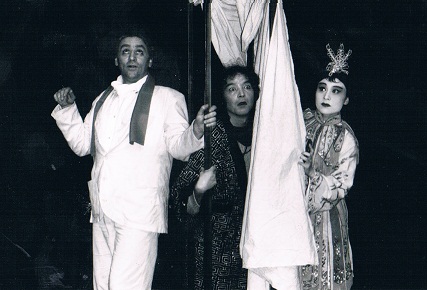
In "No Limit" zit schrijver Charley zonder ideeën. Op de computer raakt hij verzeild in de Tang-periode van het China van meer dan duizend jaar geleden. waar hij zijn personage Rob moet zien te redden. Daar ontmoeten zij de legendarische concubine Yan aan het keizerlijke hof. Zij halen haar over met hen te vluchten naar een vrij land in de moderne tijd. In de voorstelling ontmoet de Peking Opera van het oude China de moderne westerse popmuziek.
Jeugdtheater op de School-Kunstdag Amsterdam, 1994 Theater De Balie. Regie: Zhu Jun
Spelers: Wang Lei, Charley Barnaart, Rob Duyker
Erfgenamen van de draak was in 1993 een nog jonge toneelgroep die het gedachtegoed van de Chinese cultuur wilde uitdragen. Zij wilde een brug vormen tussen westers en Chinees theater en met een totaal nieuwe vorm in de westerse theaterwereld staan. De actrice Wang Lei is afgestudeerd aan de Peking Opera school te Shanghai. In 1988 werd zij als enige actrice afkomstig uit Shanghai uitgenodigd voor het beroemde Mei Pei Festival in Hong Kong.
Regisseur, Zhu Jun, noemt zich zelf een moderne Chinese theatermaker. In China kreeg hij les in modern westers theater en stond koel tegenover de traditionele Chinese cultuur. Met zijn vlucht uit China is zijn belangstelling voor de Chinese cultuur juist steeds meer toegenomen. Naar Nederland gekomen heeft hij een half jaar lang de opleiding voor theaterdocent docent gevolgd in Amsterdam. En richtte de theatergroep Erfgenamen van de Draak op. NO LIMIT was het tweede stuk dat hij schreef na OP HET EERSTE GEZICHT
